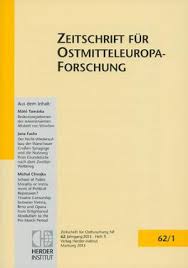Das Kreuz in Auschwitz. Ein polnischer Gedächtnisdiskurs der 1990er Jahre
The Cross at Auschwitz. A Polish historical debate of the 1990s
Author(s): Imke HansenSubject(s): Jewish studies, Political history, Transformation Period (1990 - 2010), History of Communism
Published by: Verlag Herder-Institut
Keywords: Auschwitz; Polish historical debate; 1990s;
Summary/Abstract: Following the demise of Communism Poland was faced with a multitude of transformational challenges. It was not only a matter of building up a market economy, but also of establishing democracy and constructing new political institutions. Polish society, at all levels, was absorbed in changing the power structures, creating new elites, developing political participation, finding its position in international affairs, reformulating the role of various institutions, and redefining its national identity. Political liberalisation opened the doors of public debate and discussion free from government control and censorship. In this atmosphere, interest was particularly directed to historical subjects, or, to be more precise, subjects which called the existing historical orthodoxies into question. One of these was the Cross at Auschwitz. What became known as “the Cross debate”, which took place across the whole spectrum of Polish media at the end of the 1990s, was characterised by three main features. Firstly the debate concerned Auschwitz, a place of intense historical national interest in Poland – a place which, under Communism was a permanent bone of contention between the communists, who wished to use it as an instrument in their version of history, and national-Catholic identification, and which, for this reason, acted as a bridge between the two sides. Secondly the debate, because of its focus, attracted attention far beyond Poland’s borders and made evident the diverse appraisal of the significance of Auschwitz both within and outside Poland, which in its turn led to numerous misunderstandings. Thirdly the debate reflected the social phenomena and processes – not untypical of a society in transition – which characterised Poland in the 1990s. In my study I use the Cross debate to reveal some of the fundamental characteristics and problems of Polish society in transition at the end of the 1990s. This is done on the basis of a survey of Polish history and the importance of this historical memorial site in Poland, something which is generally given only cursory attention among international contributors to the debate. Finally, the Auschwitz Cross debate 1998-1999 is analysed with the focus on three fundamental social questions which crystallised in the course of the debate: the redefinition of national identity, the continuing existence of positive and negative stereotypes, and the political power struggle between church and state. The basis of the analysis is the public debate in Polish press in 1998-1999. To illustrate the debate as fully as possible, the analysis not only includes reports and commentaries but also excerpts from speeches and sermons, as well as readers’ letters.
Journal: Zeitschrift für Ostmitteleuropa-Forschung
- Issue Year: 59/2010
- Issue No: 3
- Page Range: 366-393
- Page Count: 28
- Language: German

